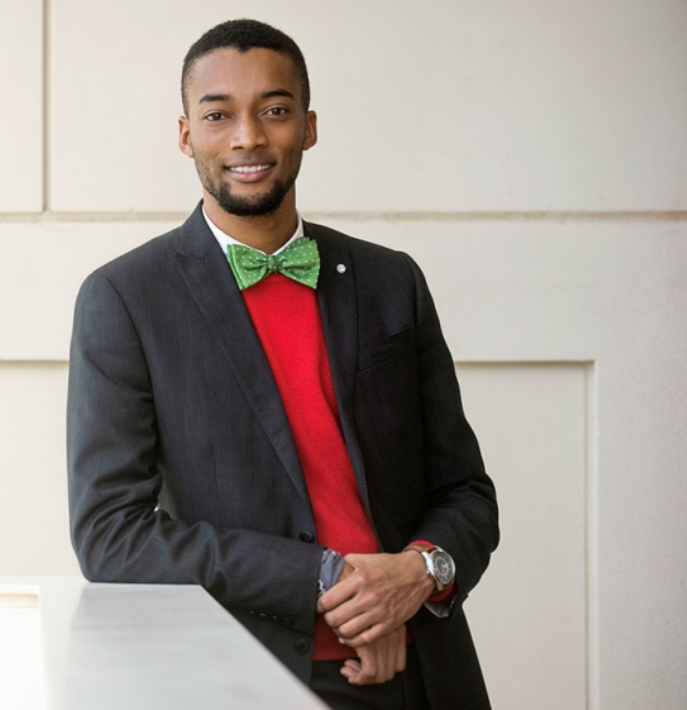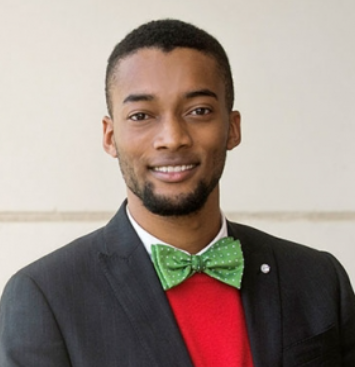By Matt Windsor
UAB Magazine

Lamario Williams likes solving problems. In his four years at the University of Alabama at Birmingham, the St. Louis-born, Huntsville-raised senior has tackled quite a few. He has done research on laser development in the Department of Physics, tutored Blazer athletes in math and science courses, worked on genetic analysis of cardiac cells at Mount Sinai in New York City, analyzed metabolic changes accompanying diabetes and heart failure in UAB’s Department of Pathology Division of Molecular and Cellular Pathology, and learned how doctors can bring healing without expensive diagnostic tools at community hospitals in Nepal and rural Mexico.
The 22-year-old graduated at the end of April and will remain in Birmingham for at least eight more years.
“I’ll be doing the National Institutes of Health-funded MD-PhD program at UAB,” he said. “I will be continuing my research efforts in cardiac metabolism, personalized medicine, and cardiovascular diagnostic tools. I’m currently finishing up my SciTech Honors Thesis and transitioning into beginning graduate school work by figuring out mentors and collaborators.”
What drove his decision to stay in the Magic City? “I see how much more work I can get accomplished here instead of New York or at the NIH in Washington, DC.,” he said. “My goal of founding my own nonprofit is much more realistic here. I will actually be participating in the Jefferson Country Adolescent Mentoring Program that works with high-risk youth (kids that have been entered into the Jefferson County System).”
Williams said he was beginning to realize that he wanted a nonprofit to begin as a pipeline program “that aids students with reaching their goals and living fulfilling lives. I still eventually want my nonprofit to aid in global outreach, making long term relationships and strengthening individual communities abroad,” he said.
Williams double-majored in biomedical sciences in the School of Health Professions and biophysics in the College of Arts and Sciences, and minored in math and chemistry. He is second author on a publication in the journal Optical Materials Express, and presented his research at the 2016 Quadrennial Physics Congress in San Francisco and Experimental Biology 2016 in San Diego. Williams was also one of 12 students nationwide selected for a 2016 Scholarship of Excellence award from the Association of Schools of Allied Health Professions.
How did you get involved in research?
Being a part of the SciTech Honors Program was instrumental. It’s such a diverse group of people, and [SciTech director] Dr. Diane Tucker promotes an interdisciplinary view of science, giving us exposure to researchers from biology and chemistry to business and the arts. SciTech has taught me about the innovative process that I just cannot get enough of.
Then in the physics department, I learned the critical thinking skills I need to do research. I never had physics in high school, but the faculty don’t pull any punches. I have so much praise for them pushing me to truly learn and understand the material.
Why did you choose to major in biomedical sciences as well?
The program prepares you for a career in any of the health professions: you have pre-med, pre-physician assistant, pre-dentistry students and more. The faculty challenges us to think like a physician – understanding the anatomy and physiology and how they apply to real-world problems.
You’ve also shadowed physicians in low-resource areas on medical mission trips to Mexico and Nepal. What did those trips teach you?
In countries with less money dedicated to healthcare, physicians become proficient in diagnosing and treating patients for the lowest cost possible. The research is often guided not by which therapies will sell the best, but by which will have the largest impact on treating disease.
What are your career plans?
I plan to attend a medical scientist training program to earn both an M.D. and a Ph.D. In my research now, I’m looking at diabetic cardiomyopathy in the lab of Dr. Adam Wende. I’ve learned plenty from him about asking relevant questions that I can create a clear way to answer. Being at UAB, surrounded by so much groundbreaking research, has made me not just want to practice medicine but to advance it. I aspire to look at the intersections between heart disease, nutrition and biophysics.
I’ve always been interested in medicine. My family has been affected greatly by heart disease, which piqued my interest in interventional cardiology. I’ve seen them conquer the disease, and I strive to be a part of the jubilation that comes with health.
What advice do you have for undergraduates who are interested in research?
The key to doing good research is finding a topic you are passionate about. The great thing about UAB is that you can easily find a lab that does something you are interested in. Research is difficult, but don’t let one unfavorable experience taint your view of research as a whole. There are several different types of questions that you can answer in different ways.





